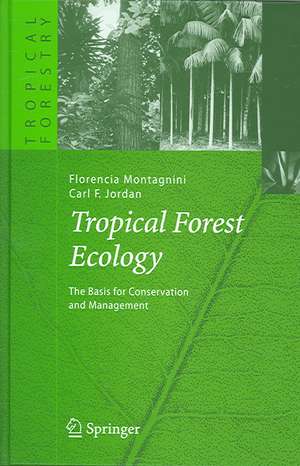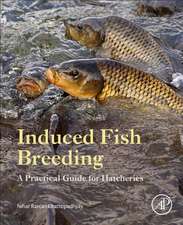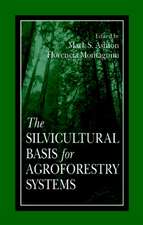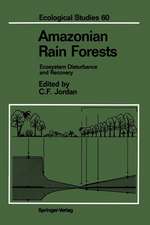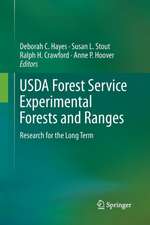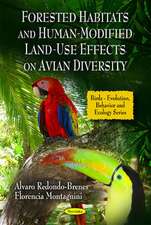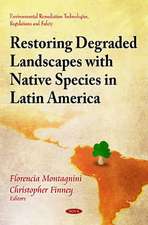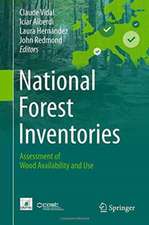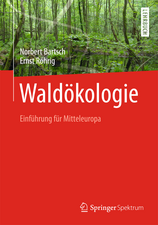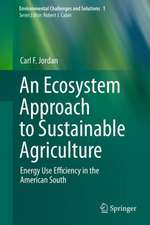Tropical Forest Ecology: The Basis for Conservation and Management: Tropical Forestry
Autor Florencia Montagnini, Carl F. Jordanen Limba Engleză Hardback – 24 mar 2005
Here, a multi-disciplinary approach is presented, to better the understanding of tropical forest ecology, as a necessary step in developing adequate strategies for conservation and management. The authors have long experience in both academic and practical matters related to tropical forest ecology and management.
| Toate formatele și edițiile | Preț | Express |
|---|---|---|
| Paperback (1) | 1212.03 lei 6-8 săpt. | |
| Springer Berlin, Heidelberg – 22 oct 2010 | 1212.03 lei 6-8 săpt. | |
| Hardback (1) | 1219.46 lei 6-8 săpt. | |
| Springer Berlin, Heidelberg – 24 mar 2005 | 1219.46 lei 6-8 săpt. |
Preț: 1219.46 lei
Preț vechi: 1487.15 lei
-18% Nou
Puncte Express: 1829
Preț estimativ în valută:
233.34€ • 243.63$ • 193.12£
233.34€ • 243.63$ • 193.12£
Carte tipărită la comandă
Livrare economică 04-18 aprilie
Preluare comenzi: 021 569.72.76
Specificații
ISBN-13: 9783540237976
ISBN-10: 3540237976
Pagini: 308
Ilustrații: XI, 295 p.
Dimensiuni: 155 x 235 x 22 mm
Greutate: 0.65 kg
Ediția:2005
Editura: Springer Berlin, Heidelberg
Colecția Springer
Seria Tropical Forestry
Locul publicării:Berlin, Heidelberg, Germany
ISBN-10: 3540237976
Pagini: 308
Ilustrații: XI, 295 p.
Dimensiuni: 155 x 235 x 22 mm
Greutate: 0.65 kg
Ediția:2005
Editura: Springer Berlin, Heidelberg
Colecția Springer
Seria Tropical Forestry
Locul publicării:Berlin, Heidelberg, Germany
Public țintă
Professional/practitionerCuprins
Importance of Tropical Forests.- Characteristics of Tropical Forests.- Classification of Tropical Forests.- Deforestation in the Tropics.- Management of Tropical Forests.- Plantations and Agroforestry Systems.- Approaches for Implementing Sustainable Management Techniques.- Conclusions.
Recenzii
From the reviews:
"As tropical forests might be particularly susceptible to (human) disturbances it is very much appreciated that the results have been bundled into a book which gives an overview about the subject. … the book is suited for a wide array of students with either a forestry, biology or environmental background. The list of references shows a good representation of up to date literature … . the book can be recommended for those readers with an interest of tropical forest ecology … .” (Paul Keßler, Blumea, Vol. 51 (1) 2006)
"This is a much needed textbook on the causes of tropical deforestation and the forestry techniques needed for management and restoration. … This book will be a useful management resource for foresters or a supplementary text for those studying tropical rainforest ecology." (Southeastern Naturalist, Vol. 5 (3), 2006)
"The book consists of 8 chapters. … In summary, the authors succeeded in presenting a comprehensive overview on tropical forest ecology, reflecting the authors’ extensive experience with the topic. … is illustrated with many tables, figures and photos. … is well-organized, e.g. specific information and case studies are presented in separate text boxes. … valuable to anyone who needs a thorough and readable synthesis of tropical forest ecology and an overview of adequate management systems." (Luitgard Schwendenmann, Phytocoenologia, Vol. 38 (1-2), August, 2008)
“The purposes of the book by Montagnini and Jordan are ‘to bring together and examine evidence that bears on the question of the uniqueness of tropical ecosystems’, to find answers to the question of inherent ecosystem fragility and draw conclusions for forest management. … The view point is North-American which for a more Eastern reader creates … interesting insights. The many examples are well presented, often in boxes; the choice of mostly recent literature is rather selective; the subjectindex is helpful … .” (Eberhard F. Bruenig, International Forestry Review, Vol. 7 (4), December, 2005)
"As tropical forests might be particularly susceptible to (human) disturbances it is very much appreciated that the results have been bundled into a book which gives an overview about the subject. … the book is suited for a wide array of students with either a forestry, biology or environmental background. The list of references shows a good representation of up to date literature … . the book can be recommended for those readers with an interest of tropical forest ecology … .” (Paul Keßler, Blumea, Vol. 51 (1) 2006)
"This is a much needed textbook on the causes of tropical deforestation and the forestry techniques needed for management and restoration. … This book will be a useful management resource for foresters or a supplementary text for those studying tropical rainforest ecology." (Southeastern Naturalist, Vol. 5 (3), 2006)
"The book consists of 8 chapters. … In summary, the authors succeeded in presenting a comprehensive overview on tropical forest ecology, reflecting the authors’ extensive experience with the topic. … is illustrated with many tables, figures and photos. … is well-organized, e.g. specific information and case studies are presented in separate text boxes. … valuable to anyone who needs a thorough and readable synthesis of tropical forest ecology and an overview of adequate management systems." (Luitgard Schwendenmann, Phytocoenologia, Vol. 38 (1-2), August, 2008)
“The purposes of the book by Montagnini and Jordan are ‘to bring together and examine evidence that bears on the question of the uniqueness of tropical ecosystems’, to find answers to the question of inherent ecosystem fragility and draw conclusions for forest management. … The view point is North-American which for a more Eastern reader creates … interesting insights. The many examples are well presented, often in boxes; the choice of mostly recent literature is rather selective; the subjectindex is helpful … .” (Eberhard F. Bruenig, International Forestry Review, Vol. 7 (4), December, 2005)
Notă biografică
Florencia Montagnini
Dr. Florencia Montagnini is a Professor in the Practice of Tropical Forestry at Yale University School of Forestry and Environmental Studies. Her research focuses on variables controlling the sustainability of managed ecosystems (e.g., primary and secondary forests, plantations and agroforestry systems) in the tropics, with special emphasis on Latin America. Born in Argentina, she has a BS in Agronomy from the National University of Rosario, Argentina, a Masters degree in Ecology from the Venezuelan Institute for Scientific Research (IVIC) and a Ph.D. in Ecology from the University of Georgia, USA. She has studied and worked extensively in the U.S. and throughout Latin America, and operates in collaboration with local institutions such as CATIE (Tropical Agriculture Research and Higher Education Center, Costa Rica). She is currently conducting research in Costa Rica, Panama, El Salvador, Guatemala, Nicaragua, Argentina and Brazil, on sustainable systems for restoration of degraded ecosystems.
As Director of the Program in Tropical Forestry of the Yale Global Institute of Sustainable Forestry, some of the current projects that Dr. Montagnini is conducting include examining the role of native tree species in plantations and agroforestry ecosystems in reclaiming degraded areas with species of economic value; the identification and quantification of ecological services provided by forests (biodiversity conservation, carbon fixing and storage); reforestation of degraded lands with native species, including mixed-species designs; and tropical plantation silviculture. Her research integrates ecological principles with economic, social, and policy factors in the design of sustainable land use schemes in tropical regions.
As a scientist dedicated to education in tropical ecology, restoration, and agroforestry, she teaches several courses including, Tropical Forest Ecology and Management, Agroforestry Systems, Introductionto Soil Science, and Forest Landscape Restoration. She also advises Masters and Doctoral students in the study of tropical forestry and agroforestry systems.
Carl F. Jordan
Dr. Carl Jordan began his professional career with the U.S. Atomic Energy Commission (Now Dept. of Energy) studying radioisotope movement in the rain forest of Puerto Rico in the 1960s, when radioactive fallout was a major global concern. In 1969, he moved to Argonne National Laboratory and continued studies of radioactivity, this time from reactor effluent. In 1974, he joined the Institute of Ecology, University of Georgia, and for ten years led a major study of the structure and function of rain forests in the Amazon Territory of Venezuela. Together with scientists from the Venezuelan National Laboratory and the Max Planck Institute in Germany, over 100 peer-reviewed papers were published, and a summary volume was put out by UNESCO. In the 1980s, he expanded his tropical horizons with research projects and students in the tropical forests Brazil, Ecuador, Venezuela, Costa Rica, Guatemala, Mexico, Thailand, The Philippines, and China (Yunnan Province). A main focus of his work and those of his students was the impact of forestry and agriculture on tropical forests. Notable studies included the Jari pulp project and the Carajás development project, both in the eastern Amazon region of Brazil, an evaluation of the "Movement of People without Land" (MST) movement in Pernambuco, Brazil, an evaluation of Participatory Action Research in Altimira Brazil, and reforestation by the "Forest Village System" in Northern Thailand.
In the mid-nineties, Jordan phased out his tropical work, and began to apply many of the principles learned in the tropics to an organic farm in the Piedmont Region of Georgia, where soils and climate are similar to those in many rain forest regions (red ultisols, 8 months per year of hot, wet climate, 4 months of dormancy). Of particular interest isdevelopment of "tropical style" alley cropping (leguminous hedge-rows with economic crops in the "alley" between the hedges).
As a tropical ecologist, he finds an intriguing question in his new work in the U.S.: "Why are there so few species in extra-tropical latitudes?"
Dr. Florencia Montagnini is a Professor in the Practice of Tropical Forestry at Yale University School of Forestry and Environmental Studies. Her research focuses on variables controlling the sustainability of managed ecosystems (e.g., primary and secondary forests, plantations and agroforestry systems) in the tropics, with special emphasis on Latin America. Born in Argentina, she has a BS in Agronomy from the National University of Rosario, Argentina, a Masters degree in Ecology from the Venezuelan Institute for Scientific Research (IVIC) and a Ph.D. in Ecology from the University of Georgia, USA. She has studied and worked extensively in the U.S. and throughout Latin America, and operates in collaboration with local institutions such as CATIE (Tropical Agriculture Research and Higher Education Center, Costa Rica). She is currently conducting research in Costa Rica, Panama, El Salvador, Guatemala, Nicaragua, Argentina and Brazil, on sustainable systems for restoration of degraded ecosystems.
As Director of the Program in Tropical Forestry of the Yale Global Institute of Sustainable Forestry, some of the current projects that Dr. Montagnini is conducting include examining the role of native tree species in plantations and agroforestry ecosystems in reclaiming degraded areas with species of economic value; the identification and quantification of ecological services provided by forests (biodiversity conservation, carbon fixing and storage); reforestation of degraded lands with native species, including mixed-species designs; and tropical plantation silviculture. Her research integrates ecological principles with economic, social, and policy factors in the design of sustainable land use schemes in tropical regions.
As a scientist dedicated to education in tropical ecology, restoration, and agroforestry, she teaches several courses including, Tropical Forest Ecology and Management, Agroforestry Systems, Introductionto Soil Science, and Forest Landscape Restoration. She also advises Masters and Doctoral students in the study of tropical forestry and agroforestry systems.
Carl F. Jordan
Dr. Carl Jordan began his professional career with the U.S. Atomic Energy Commission (Now Dept. of Energy) studying radioisotope movement in the rain forest of Puerto Rico in the 1960s, when radioactive fallout was a major global concern. In 1969, he moved to Argonne National Laboratory and continued studies of radioactivity, this time from reactor effluent. In 1974, he joined the Institute of Ecology, University of Georgia, and for ten years led a major study of the structure and function of rain forests in the Amazon Territory of Venezuela. Together with scientists from the Venezuelan National Laboratory and the Max Planck Institute in Germany, over 100 peer-reviewed papers were published, and a summary volume was put out by UNESCO. In the 1980s, he expanded his tropical horizons with research projects and students in the tropical forests Brazil, Ecuador, Venezuela, Costa Rica, Guatemala, Mexico, Thailand, The Philippines, and China (Yunnan Province). A main focus of his work and those of his students was the impact of forestry and agriculture on tropical forests. Notable studies included the Jari pulp project and the Carajás development project, both in the eastern Amazon region of Brazil, an evaluation of the "Movement of People without Land" (MST) movement in Pernambuco, Brazil, an evaluation of Participatory Action Research in Altimira Brazil, and reforestation by the "Forest Village System" in Northern Thailand.
In the mid-nineties, Jordan phased out his tropical work, and began to apply many of the principles learned in the tropics to an organic farm in the Piedmont Region of Georgia, where soils and climate are similar to those in many rain forest regions (red ultisols, 8 months per year of hot, wet climate, 4 months of dormancy). Of particular interest isdevelopment of "tropical style" alley cropping (leguminous hedge-rows with economic crops in the "alley" between the hedges).
As a tropical ecologist, he finds an intriguing question in his new work in the U.S.: "Why are there so few species in extra-tropical latitudes?"
Textul de pe ultima copertă
Research in tropical forestry is confronted with the task of finding strategies to alleviate pressure on remaining forests and techniques to enhance forest regeneration and restore abandoned lands, using productive alternatives that can be attractive to local human populations. In addition, sustainable forestry in tropical countries must be supported by adequate policies to promote and maintain specific activities at local and regional scales.
Here, a multi-disciplinary approach is presented to better the understanding of tropical forest ecology, as a necessary step in developing adequate strategies for conservation and management. The authors have long experience in both academic and practical matters related to tropical forest ecology and management.
Here, a multi-disciplinary approach is presented to better the understanding of tropical forest ecology, as a necessary step in developing adequate strategies for conservation and management. The authors have long experience in both academic and practical matters related to tropical forest ecology and management.
Caracteristici
There are few, if any, books that focus on ecological aspects most critical for sustainable management and conservation of tropical forests This book undertakes to fill this gap – providing ecological information most critical for management and conservation Includes supplementary material: sn.pub/extras
